

SUBSCRIBE TO OUR FREE NEWSLETTER
Daily news & progressive opinion—funded by the people, not the corporations—delivered straight to your inbox.
5
#000000
#FFFFFF
To donate by check, phone, or other method, see our More Ways to Give page.


Daily news & progressive opinion—funded by the people, not the corporations—delivered straight to your inbox.
"If confirmed, Linda McMahon will dismantle public education as we know it to fund tax cuts for billionaires," one union leader warned.
Critics of U.S. President Donald Trump's plans for the Department of Education pointed to billionaire GOP megadonor Linda McMahon's Senate confirmation hearing on Thursday as the latest proof that the Republican administration intends to destroy public schools.
McMahon, accused of "enabling sexual abuse of children" as World Wrestling Entertainment CEO, appeared before the Senate Committee on Health, Education, Labor, and Pensions as the education secretary nominee despite Trump making clear that he wants to shutter the department and billionaire Elon Musk—who is trying to obliterate the federal bureaucracy as chair of the Department of Government Efficiency (DOGE)—claiming last week that "it doesn't exist" anymore.
"Education is meant to be the great equalizer for our children, not a great investment opportunity for the billionaires ransacking our federal government."
"Most of us believe every student deserves the opportunity, resources, and support to reach their full potential no matter where they live, the color of their skin, or how much their family earns," said Becky Pringle, president of the National Education Association, the largest U.S. teachers union. "But we didn't hear any of that today. As I travel around the country, parents and educators tell me their schools need more resources and more opportunities that will help students live into their brilliance. They do not want to gut public education or public schools."
She warned that "if confirmed, Linda McMahon will dismantle public education as we know it to fund tax cuts for billionaires. She will push vouchers that take funding from our public schools, where 90% of all children and 95% of those with disabilities learn and grow. Public funds should stay in our public schools. Our students need an education secretary committed to fully funding the programs that can help them reach their full potential, not siphoning money to send to private schools."
"The Senate must reject Linda McMahon as secretary of education. The agenda is clear and dangerous," Pringle argued. "Whether in Washington, with legal actions and lawsuits, or through grassroots actions in communities across the country, educators will continue to protect our students from this reckless agenda."
While the GOP-controlled Senate seems likely to confirm McMahon—so far, the chamber hasn't blocked any "fundamentally unfit" and "profoundly unqualified" Trump nominees—union and community leaders, educators, parents, and students have still pressured lawmakers to oppose McMahon and battle Trump's assault on public education.
They even braved winter weather at the U.S. Capitol in Washington, D.C. on Wednesday for a related rally. MomsRising executive director and CEO Kristin Rowe-Finkbeiner called McMahon "wholly unqualified" and declared that "President Trump's education plan puts our children at risk and has grave implications for our workforce and our economy."
American Federation of Teachers (AFT) president Randi Weingarten, who was also at the rally, pointed out that "inside the Education Department, the world's richest man and his minions have been rifling through 45 million people's private student loan accounts and feeding the data into artificial intelligence in one of the biggest data hacks in U.S. history."
In response, AFT and unions sued multiple departments and the Office of Personnel Management "for violating the Privacy Act by improperly disclosing the sensitive records of millions of Americans to DOGE staff," Weingarten explained Wednesday. "And tomorrow, we hope Linda McMahon will discuss what she'll do to secure the personal data of veterans who receive benefit payments, current and former federal employees whose confidential employment files reside in OPM's system, and teachers whose pathway to the classroom was reliant on student loans to pay for college tuition. The American people deserve to know what she'll do to kick Elon Musk and DOGE out of the Education Department, out of our schools, and out of our data."
During the Senate hearing, "Democrats repeatedly grilled McMahon on her willingness to follow orders from Trump or Elon Musk even if they run afoul of congressional mandates," The Associated Pressreported, noting that the nominee "played down the work" of DOGE and "pledged to uphold the law and show deference to Congress."
McMahon also addressed the administration's push to shut down the department. According to the AP:
"We'd like to make sure that we are presenting a plan that I think our senators could get on board with, and our Congress could get on board with, that would have a better functioning Department of Education," McMahon said. But closing the department "certainly does require congressional action."
McMahon said the president's goal is not to defund key programs, but to have them "operate more efficiently." But she questioned whether some programs should be moved to other agencies. Enforcement of the Individuals with Disabilities Education Act, she suggested, "may very well rest better" in the Department of Health and Human Services, an agency that already has oversight of disability issues. The agency's Office for Civil Rights, she said, could fit better at the Justice Department.
Responding to the hearing in a statement, Aissa Canchola Bañez, policy director of the Student Borrower Protection Center, said that "Linda McMahon's testimony was nothing more than two hours worth of gaslighting. McMahon had the opportunity to state clearly and unequivocally that she will protect students, borrowers, and working families across the nation from the chaos that has already ensued as a result of President Trump and Elon Musk's work to make their Project 2025 agenda the law of the land. She did not."
"When asked whether she would abide by a directive by President Trump that breaks a law, her nonanswer spoke volumes. It is clear that Linda McMahon's blind loyalty to President Trump will guide her decision-making should she be confirmed to serve as the nation's highest education official—and our students and communities will pay the price," she cautioned.
Stacy Davis Gates, president of the Chicago Teachers Union, an AFT affiliate, was a similarly critical, saying that "today's hearing made clear that Donald Trump is not trying to roll the country back to 1950, he is trying to roll us back to 1850. McMahon's dog whistles, her promotion of segregationist school choice policies, and her boss' commitment to converting civil rights protections into tools to police students are all reversals of what formerly enslaved Africans fought for and created during Reconstruction after the Civil War."
"Donald Trump and whoever becomes his secretary should think twice before dismantling the Department of Education," she continued. "As a social studies teacher, it's incumbent on me to provide a brief civics lesson: We have a system of checks and balances that prevents them from doing so. But more importantly, this isn't an obscure federal office. This is a backbone of the government that millions of families with children in our public schools rely on."
"By continuing to come for our public schools, they are further angering the Black families who count on civil rights protections, the families of children with disabilities who rely on federal standards, the families in poverty who rely on federal support, and anyone who is sickened to see queer and transgender students targeted and bullied by the federal government," she added. "Education is meant to be the great equalizer for our children, not a great investment opportunity for the billionaires ransacking our federal government."
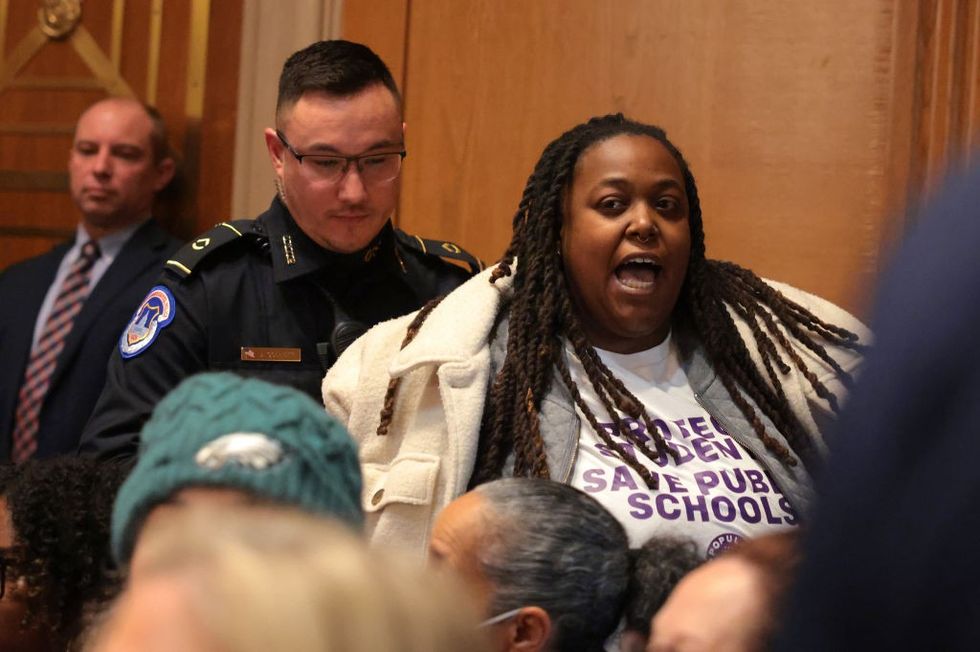
Several protesters interrupted Thursday's hearing, including to express concerns related to the Individual With Disabilities Education Act and the Trump administration's attacks on LGBTQ+ youth.
One lawmaker who took aim at Trump and McMahon during the event—and was publicly thanked by the AFT for doing so—was Sen. Bernie Sanders (I-Vt.), the committee's ranking member.
"In America, we must not allow our educational system to become a two-tier system," Sanders said, calling it "absurd" to provide vouchers for families to send their children to private schools rather than public ones—the focus of a recent Trump executive order.
Sanders also sounded the alarm about using taxpayer money for such vouchers in a four-minute video from his office stressing that "Donald Trump is dead set on destroying public education in this country."
Tony Carrk, executive director of the watchdog group Accountable.US, warned of the long-term consequences, saying after the hearing that "starving cash-strapped states of critical public education resources is a recipe for generational failure."
"The Trump-McMahon-Project 2025 agenda would leave millions of kids behind and further rig the system against low-income communities," he continued. "McMahon would be just the latest to join the Trump administration's billionaire club, which has made no allusions about its plans to let the wealthy cut to the head of the line while working people wait for the scraps."
Carrk also pointed to her time in the wrestling industry, declaring that "Linda McMahon puts on quite a show of confidence, but her alleged actions knowing about and mishandling the sexual abuse of children at her corporation should give no one confidence that she would enforce Title IX sex discrimination protections as education secretary."
Big banks like Chase have repeatedly targeted communities, taxpayers, and even our schools with predatory debt. It's time to fight back.
Chicago’s school year kicked off amid a looming budget crisis that jeopardizes stability for both students and teachers. At the heart of the issue is a silent killer of public education: predatory bank loans, particularly from JPMorgan Chase.
During a bargaining session with the Chicago Teachers Union (CTU), I urged Chicago Public Schools (CPS) to stop allowing big banks to hold Chicago students hostage. Instead of delaying contract negotiations with teachers and risking program cuts that harm students, CPS and state officials should take legal action to recover the funds lost due to these toxic bank deals.
CPS has a deficit projection of over half a billion dollars, perpetuated by the several hundred million dollars in predatory loans from banks like JPMorgan Chase taken out nearly a decade ago. These loans have strangled CPS finances and prevented the district from providing the high-quality education Chicago's children deserve.
Predatory loans are a familiar problem for families in Chicago and around the country. These risky loans are hawked as a short-term solution to fill a gap in finances–with a steep interest rate buried in the fine print that balloons over time.
Chicago Public Schools should hold banks like Chase accountable for the harm they’ve caused Chicago’s schoolchildren.
Chase has repeatedly targeted communities, taxpayers, and even our schools with predatory debt. Chase and its predecessor banks pushed Black and brown Chicagoans into the predatory subprime mortgages that caused the 2008 financial crisis, leading to a tsunami of foreclosures that resulted in a massive loss of household wealth in communities of color.
And nearly 10 years ago, Chase closed a predatory deal with CPS that has haunted our finances ever since.
CPS was already reeling from drastic cuts to special education services in 2016, prompted by the immediate payment of $234 million in termination fees for bad deals they entered into a decade prior. An unfair school funding formula forced 50 schools to shutter three years earlier and continued to destabilize the same South and West side neighborhoods.
A twin set of threats were on the horizon: a potential takeover of schools by Governor Bruce Rauner, a Republican who was hellbent on making Illinois more like Texas, and a threat by Mayor Rahm Emanuel to lay off 6,000 teachers to close a budget gap caused by structural underfunding.
The school district desperately needed funds to pay for projects like lead abatement. Rather than face a takeover or mass layoffs, they decided to issue bonds in order to pay the termination fee. But because CPS’s credit rating had been downgraded to “junk” just a few months prior, financial giants like Chase and Nuveen exploited the opportunity.
Banks purchased the bonds from CPS at a lowball price but then sold them to other investors just months later for a much higher payoff. Over a span of two months, Chase bank made a 9.5% profit on $150 million in bonds through this arbitrage scheme, an annualized profit of 82%. This calls into question whether Chase met its legal obligation to give CPS a fair price for the bonds. Our schools are still impacted by these bad deals, paying $200 million annually for loans taken out during this moment of crisis.
CPS was also the victim of toxic interest rate swaps deals that cost the district, Chicago, and the state of Illinois hundreds of millions of dollars in the early 2000s. Banks had marketed swaps as a way for cash-strapped governments to save money, but they were laden with hidden risks that materialized as a result of the 2008 financial crisis, causing payments to skyrocket and costing taxpayers a fortune.
As with Chicago’s parking meter and Skyway deals, future generations of taxpayers were stuck holding the bag. From 2012 to 2016, the City of Chicago handed over $145 million to Chase Bank alone to terminate these toxic swaps.
CPS should hold banks like Chase accountable for the harm they’ve caused Chicago’s schoolchildren. There is strong reason to believe the banks that trapped CPS into these predatory deals violated their legal responsibilities to the district. While the district has improved its financial health since 2016, recovering the millions lost to predatory lending would help build on their progress.
Decades of underfunding and predatory banking have swallowed the district’s reserves. Now, faced with a federal reduction that could slash funding by $800 per student, the district has reached an inflection point: Will CPS hold banks accountable and fund the programs, resources, and staff that students deserve—or will they make cuts that set kids back?
"If we're going to take back the Democratic majority," said historian Harvey J. Kaye, "we're going to have to take back the people who literally abandoned the party because they felt abandoned."
On the eve of the Democratic National Convention, progressive organizers, scholars, and policymakers gathered in Chicago to discuss what matters most to working-class people across the United States and how to pressure elected Democrats to embrace and enact bold solutions.
The two-day event—billed as Progressive Central 2024: The Politics Americans Want and organized by Progressive Democrats of America (PDA) in coordination with the Arab-American Institute, The Nation, and Rainbow PUSH Coalition—was held at the Chicago Teachers Union (CTU) building, just blocks away from the United Center, where the DNC is being held this week.
"The Chicago Teachers Union is supposed to be the anchor, the destination place for progressives from across the world," said CTU president Stacy Davis Gates, whose members are months into negotiations for a new contract. "We're doing the best we can to be a beacon. And what we want to do is call the rest of the progressive movement in to say, help protect this, help anchor this, help grow it, help refine it."
The progressive conference is part of a two-decade tradition, going back to the 2004 convention, PDA communications director Mike Hersh told Common Dreams as the event wrapped up Monday, while anti-genocide protesters marched nearby outside the kickoff of the DNC, where speakers included United Auto Workers president Shawn Fain and Congresswoman Alexandria Ocasio-Cortez (D-N.Y.).
"I think lot of the energy that progressives have today is because they feel for the first time in a long time that the party has a chance to move more in lockstep with what we want to see."
"This was vintage Progressive Democrats of America," Hersh said of this year's conference. "We try to mobilize people and that's really what all of these Progressive Central events have been about."
The livestreamed conference featured panels, pre-recorded videos, and speeches on a range of key issues, including: building progressive power, the climate emergency, the crisis of American democracy, an Economic Bill of Rights, immigration reform, Medicare for All, organized labor, reproductive freedom, the Rural New Deal, structural racism, foreign policy—particularly U.S. government support for Israel's assault on the Gaza Strip—and more.
Collin Rees of Oil Change U.S. and Food and Water Action's Michelle Allen stressed the need to phase out fossil fuels and combat false climate solutions, while One Fair Wage president Saru Jayaraman and Sara Nelson from the Association of Flight Attendants-CWA delivered remarks—and a rendition of "Solidarity Forever."
"Using power builds power, and we will use our power," Nelson said. "We are not just about access politics in this room. We are about using power to make our world better for the people."
William Walter, who is part of Young PDA, Our Wisconsin Revolution's leader, and a Democratic candidate for his state Assembly, explained that "our initial approach was, 'What would it look like if we held a progressive national convention akin to the DNC or RNC, but devoted to progressive policies, progressive issues, progressive legislation?'"
Reflecting on her experience attending the event, Beaei Pardo, executive director of Code? Whatever!, told Common Dreams that the event "maps the body of honest ideas, systemic nurturing for self-determination, stories that help us 'get it' about what matters for good life, pragmatic history, theory we can test, and a ready community unafraid to consider the possibilities of our humanity."
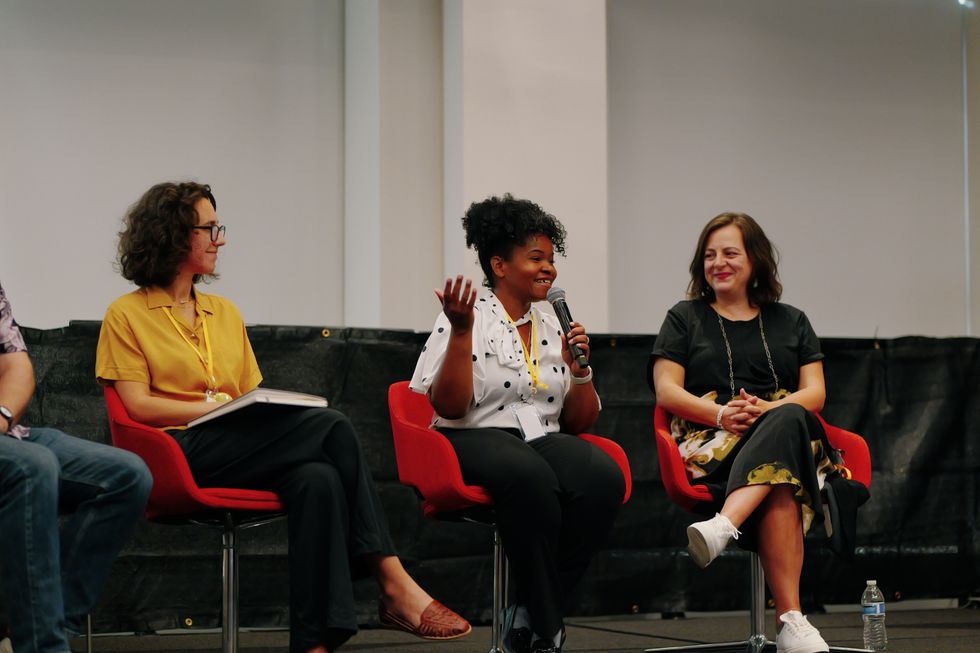
The programming offered visions of how the Democratic nominee, Vice President Kamala Harris, and her running mate, Minnesota Gov. Tim Walz—coupled with a Democrat-controlled Congress—could tackle these topics, and how to compel them to do so.
"Right now in the United States, there are four prohibitive costs that you experience across life that block young people entering into the economy from having a successful and comfortable economic life readily available to them," PDA executive director Alan Minksy said just before the event began. They are the costs of having a child, education, healthcare, and housing.
"You're not going to be a successful administration if you don't address these things, and the mainstream of Democratic policy is going to fail to produce the kind of society that Americans want to live in," Minsky warned. "We have to be adamant about how we have the solutions to this stuff... Not just maintenance of our democracy, but actually reinvigoration of our democracy."
He added that "one would have to be naïve to believe that an incoming Democratic administration's ready to go against all the power and money and wealth... on the right wing of the party and by the Republicans, but we have to make them see that that's the way to create the society that Americans want to live in."
Over the past few years, Minsky has joined historian Harvey J. Kaye, professor emeritus at the University of Wisconsin - Green Bay, in arguing that progressive groups and unions should create a grand coalition that will press the Democratic Party to advance a 21st Century Economic Bill of Rights, a focus of one of the Sunday presentations.
As Kaye spoke, a screen above him displayed a clip of a comic that he and Matt "The Letterhack" Strackbein published in Common Dreams, tracing the idea back to former President Franklin D. Roosevelt's State of the Union speech 80 years ago, and the 10 proposed rights:
In terms of actually pursuing policies in line with the Economic Bill of Rights, Kaye told Common DreamsTuesday, "it's too late for this particular convention, but... it's not too late for a Harris presidency."
The proposal—which polling shows would be popular with the American public—could even motivate voters to support Harris and Walz, who are working to defeat Republican former President Donald Trump and Sen. JD Vance (R-Ohio) in November.
"Just imagine if Tim Walz... just one of them got up and said... 'Our ambition is to redeem the legacy of FDR in favor of an Economic Bill of Rights,'" Kaye said. "You can just lay them out and then start talking about it in policy terms if you wish. In other words, if we're going to take back the Democratic majority, we're going to have to take back the people who literally abandoned the party because they felt abandoned."
While some local and state candidates have in recent years embraced and even run on an Economic Bill of Rights, a starting point for promoting related legislation at the federal level, Kaye noted, is to "get into a couple of congressional folks' minds."
Members of Congress who spoke at Progressive Central included Sen. Bernie Sanders (I-Vt.), who declared Monday—ahead of his Tuesday DNC address—that "the American people want us to take on the greed of the oligarchy."
There were also video messages from a few Democrats as well as appearances by Reps. Danny Davis (D-Ill.), Maxwell Frost (D-Fla.), Jesús "Chuy" García (D-Ill.), Jonathan Jackson (D-Ill.), Pramila Jayapal (D-Wash.), Ro Khanna (D-Calif.), Barbara Lee (D-Calif.), Jim McGovern (D-Mass.), and Delia Ramirez (D-Ill.).
Khanna—who mentioned FDR's Economic Bill of Rights in his 2022 book and was part of the same Sunday session as Kaye—told the audience that "the secrets of America's future are in our history" and "we need ideas that move people."
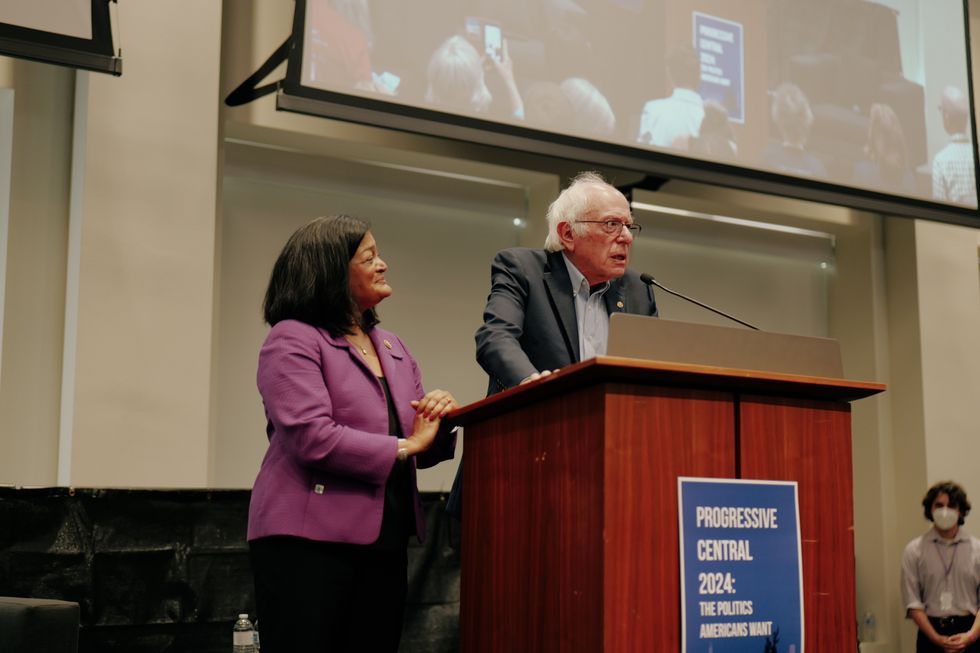
One of those ultra-popular ideas is Medicare for All, which Jayapal discussed during a Sunday panel. The popularity of universal healthcare presents an opportunity for "a great organizing moment," she acknowledged, sharing her hopes to coordinate the reintroduction of the Medicare for All Act with related local and state measures.
While Jayapal and Sanders' bill envisions a full transformation of the U.S. healthcare system, she told Common Dreams that "we're going to try to start to get there by some expansions and modifications to Medicare—so expanding Medicare to include dental, vision, and hearing... That will be a big priority."
"Reducing the Medicare eligibility age to at least 60 will be a big priority," the Congressional Progressive Caucus chair added. "Continuing to expand the number of prescription drugs that are negotiated will be a big priority. And then getting rid of what I call the 'Medicare Disadvantage' plans that are trying to privatize Medicare."
Enacting the healthcare reforms that Jayapal outlined will require expanding the Democratic majority in the Senate and reclaiming the House of Representatives—where progressives who have supported a call to end Israel's assault on Gaza are under sustained attack. This summer, Reps. Jamaal Bowman (D-N.Y.) and Cori Bush (D-Mo.) lost their primaries to Democrats backed by the American Israel Public Affairs Committee (AIPAC) and rich Republican donors.
"We need Bowman in the Congress. We need Bush in the Congress," Nina Turner—who was targeted by dark money during her 2021 Democratic primary run to fill a vacant seat in Ohio—told the crowd. "But we left them on the side of the road."
Turner also challenged Democrats who have spent this election cycle raising the alarm about Project 2025—which includes a sweeping far-right policy agenda written by Trump allies—by urging the party to put forward its vision for transforming the nation in a positive direction. "Where's their Project 2025?" she asked, asserting that the best way to win voters is "by having policies of your own."
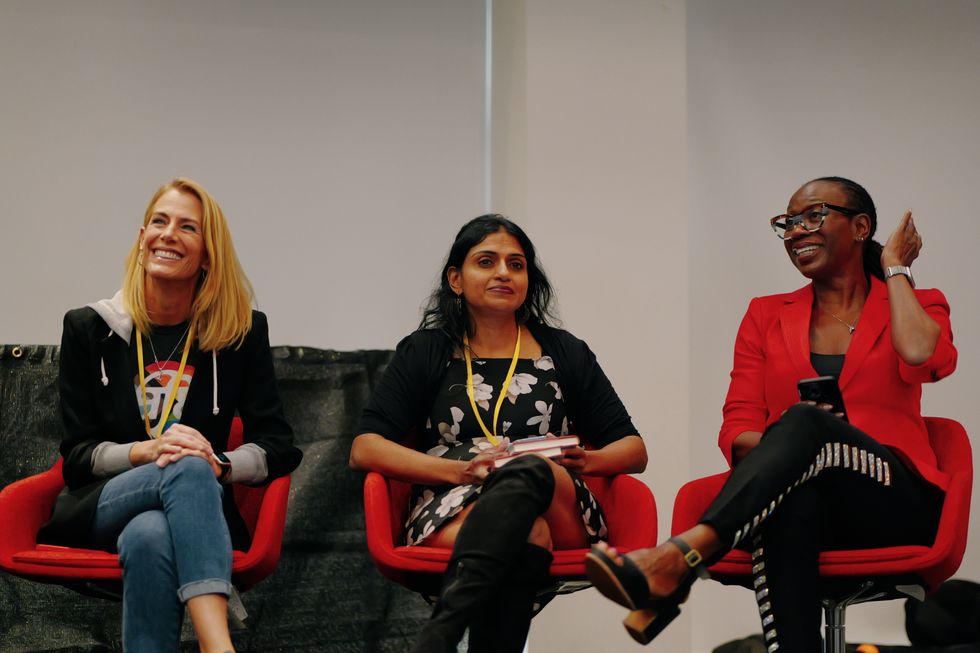
Since taking the torch from President Joe Biden last month, Harris has started sharing a policy message that includes an economic agenda to boost access to affordable housing, lower medical costs, and assist families raising young children.
"The economic framework that the vice president and her running mate have come out with so far is really a good start," Turner told Common Dreams, noting the need for progress on issues including calls for a cease-fire and arms embargo regarding Gaza. "It's obvious that there are components of the progressive movement who are excited about the change from Biden to Harris-Walz, but also don't let that excitement delude Democrats into thinking they're just going to get a free ride."
"We're in a sugar high right now. That's how I'm going to describe it. We could come crashing down if they're not careful," she warned. "They're going to have to do the work, hear the cries or the concerns of the very voters that they're trying to touch, and communicate with those voters in a way that says, 'We hear you and we see your pain.'"
"Just talk to people about healthcare. Just talk to people about the cost of living. They want relief. And I think they will support anybody that legitimately is going to give them that relief," she added, urging Harris and Walz to "shake off neoliberalism, shake off incrementalism, and go full throttle for the working class."
Harris' selection of Walz as her vice presidential candidate has been cheered by progressive political leaders and groups, in part because of the historic legislative progress that Minnesota's Democratic-Farmer-Labor Party made under this leadership last year.
During a Monday panel, speakers from the state pushed back against the framing of it as a "Minnesota Miracle," stressing that the wins on school meals, labor protections, reproductive rights, and more were instead the result of years of organizing—an important lesson going into a potential Harris-Walz administration with a Democratic Congress.
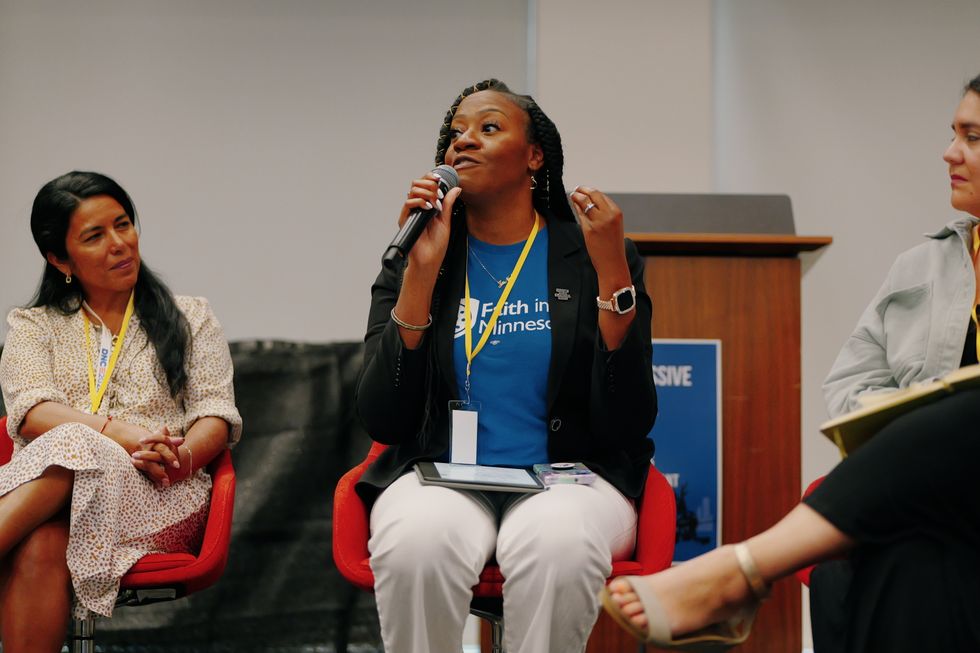
Walter of Young PDA is among those welcoming Walz's rise, telling Common Dreams: "I think the Democratic Party has a tendency to shoot themselves in the foot when decisions are obvious. They overthink or overcomplicate things that really should not be overthought. Take the easy answer. Take the free space on the bingo card. It's right in front of you. You have a very popular governor, a Midwestern state, that has universal appeal that can take your message and present it easily in a way that most people resonate with. Just do it. And for the first time in a long time, the party did it. They just did it."
"I think a lot of the energy that progressives have today is because they feel for the first time in a long time that the party has a chance to move more in lockstep with what we want to see rather than deferring to their big corporate donors," Walter said. "Now, that's not to say they won't in the end because that's our job as organizers and as progressives, to continue to pressure them and to push them left, but I think we see a path forward."
Sam Rosenthal, the political director for RootsAction, similarly told Common Dreams after the conference that progressives across the country must continue to pressure the party.
"I think we're at a precarious moment for the progressive movement," he said. "In a lot of ways, we've achieved major victories in mainstreaming positions that, even five years ago, were considered fringe and too far left. The urgent need for environmental action, the fact that we're being price gouged by pharma companies, organized labor as a bedrock of national prosperity—all these things have become more or less mainstream in the Democratic Party, because of our efforts as progressives."
"At the same time, I fear that we risk losing our unique voice if we don't continue to agitate from the left, in coalition with the grassroots activists who form the base of the progressive movement," he continued. "There's a danger that, as our movement matures and grows, our positions will become harder to distinguish from Democratic Party orthodoxy, and I don't think we should let that happen. We have to continue to play our role in pushing the Democratic Party left, exactly because that strategy has been so successful so far."